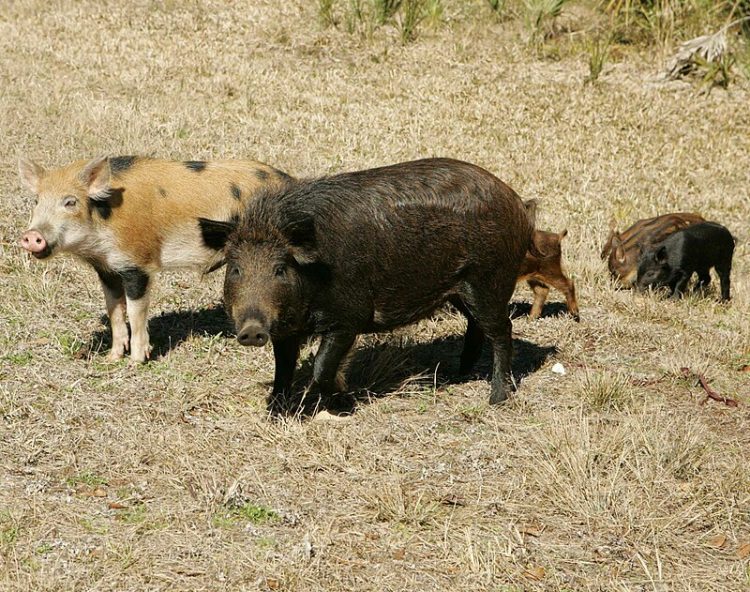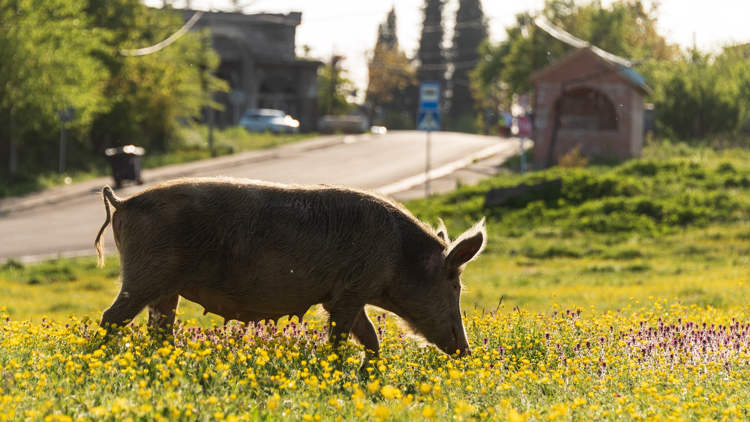Northern US states are preparing for an invasion of incredibly intelligent and highly adaptable ‘super pigs’ that threaten to spill over the border from Canada.
Feral pigs have been the bane of North America’s flora and fauna for many years now, but a new breed of ‘super pigs’ is threatening to take the problems they cause to a whole new level. The result of cross-breeding domestic pigs with wild boars, these new feral pigs combine the survival skills of the wild Eurasian boar with the size and high fertility of domestic swine, a combination that is apparently nigh impossible to control. Not only are they capable of surviving cold climates by tunneling under snow, but they also devastate crops, feed on animals of all sizes, from quails and wild turkeys to deer and elk, and spread deadly diseases like the African swine flu and strains of influenza that can affect humans.

Ryan Brook, a professor at the University of Saskatchewan and one of Canada’s leading authorities on the problem of feral pigs, calls super pigs “the most invasive animal on the planet” and “an ecological train wreck”. They breed at a rate that makes them extremely hard to control, and they can survive in the harshest of conditions thanks to an innate ability to adapt to virtually any situation.
Although pigs were introduced in North America in the 1500s, Canada’s super pig problem began during the 1980s, when the country began encouraging farmers to raise wild boar. However, when the market collapsed in 2001, many of these farmers simply cut their fences loose and released the pigs into the wild out of frustration. Unfortunately, some of these specimens were hybrids of wild boar and domestic swine. They combined the best qualities of both species, which made them an even bigger threat. For example, their large size – they can reach 300kg (661lbs) – allows them to survive at temperatures as low as -50 degrees Celsius.
“All the experts said at that time: ‘Well, no worries. If a wild pig or a wild boar ever escaped from a farm, there’s no way it would survive a Western Canadian winter. It would just freeze to death.'” Professor Brook said. “Well, it turns out that being big is a huge advantage to surviving in the cold.”

Photo: Unsplash
Apparently, the super pigs use their tusks to dig up to 2 meters under snow where they create cozy snow caves and insulate them with cattails.
“In fact, they’re so warm inside that one of the ways we use to find these pigs is to fly first thing in the morning when it’s really cold, colder than -30, and you will actually see steam just pouring out the top of the snow,” Brook said.
Super pigs are not only highly resistant to extreme temperatures but also intelligent enough to avoid human hunters. Hunting has actually made controlling the feral animals much harder, because it makes them nocturnal, only coming out when the threat of being shot is much lower.
“They’re incredibly intelligent,” Ryan Brook said. “They’re highly elusive, and also when there’s any pressure on them, especially if people start hunting them, they become almost completely nocturnal, and they become very elusive – hiding in heavy forest cover, and they disappear into wetlands and they can be very hard to locate.”
Super pigs reproduce extremely quickly. A sow can have six piglets in a litter and raise two litters in a year. That means that authorities and hunters can kill 65% or more of their population every year and their numbers would still increase. Some Canadian states have abandoned the idea of eradicating super pigs entirely, instead focusing on containing them, while US states that border Canada are preparing for an imminent invasion.
“Nobody should be surprised when pigs start walking across that border if they haven’t already,” Brook told the Associated Press. “The question is: What will be done about it?”
The Canadian expert claims that the only option is to be aggressive and to use every tool that has been shown to work against feral pigs, from large ground traps and net guns fired from helicopters to drone surveillance and tracking technology to monitor their movement. One interesting strategy is the use of so-called ‘Judas pigs’, captured specimens fitted with GPS trackers and released into the wild where they hopefully join a group of unsuspecting swine.
“The idea is that you go and find that collared animal, remove any pigs that are with it, and in an ideal world then let it go again and it will just continue to find more and more pigs,” Professor Brook said.
Super pigs are so well-established in Canada these days that their eradication has become virtually impossible, and authorities are more focused on containment.
They’re so widespread and so abundant, that certainly as late as 2018 or 19 I stopped saying that eradication was possible, they’re just so established,” Professor Ryan Brook told The Guardian. “They’ve definitely moved in, and they’re here to stay.”






